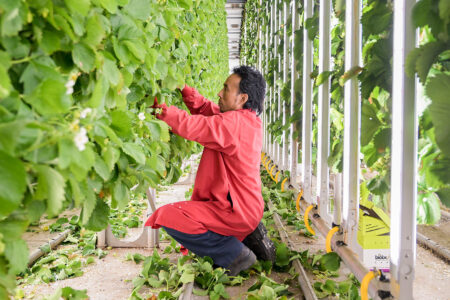
The food movement has a lot to celebrate in Canada’s first ever food policy, launched by the federal government in June. Rather than looking at the components of the food system as disconnected parts, the policy treats it as a whole ─ from where and how it’s grown and produced, to when it lands at grocery stores and markets. It brings together different actors in Canada’s food landscape to collaborate on addressing challenges and finding solutions. Still, there are gaps in the policy, and the funding announced so far is inadequate.
There are two key initiatives in the recent announcement that warrant highlighting. The first is the commitment to create a Canadian food policy advisory council, which will include representatives from civil society, academia, Indigenous organizations and the food industry, to guide the implementation and monitoring of the food policy. The selection, balance and mandate of the council will be critical to the policy’s eventual impact. Where there are adequate resources for civil society participation will be a key criterion for success.
Second, the federal government said it would engage with provinces, territories and key stakeholder groups to create a national school food program. School food programs provide a meal or snack to children, ideally a healthy one, at little or no cost to students and their families. Such a program would address the prevalence of junk food, and take into account the changing role of women in the home, shorter lunch hours in schools, and poverty. Canada is one of the only industrialized countries without a national school food program and is ranked 37th out of 41 wealthy countries for children having access to enough nutritious food, according to a 2017 report by UNICEF. A Canada-wide school food program should be universal, and the costs should be shared among the different levels of government, the private sector and not-for-profit partners.
The initial funding of $134.4 million for the overall food policy, earmarked for 2019-24, is extremely modest when set against the broader ambitions of the policy and the scale of food-related health, environmental and equity challenges faced by Canadians. Neither the advisory council nor the school food program were allotted specific funding.
There are also significant gaps in the framing of the policy itself.
Food insecurity is experienced by 4 million people in Canada, and disproportionately by Indigenous, racialized and marginalized communities. Yet, the right to food is not included as a priority outcome. Canada has said it will commit to the United Nations’ sustainable development goal number 2, “zero hunger.” To meet this target, there needs to be a concrete plan, with measurable results and a clear timeline to 2030.
The food policy says it will support “strong and prosperous First Nations, Inuit and Métis food systems,” which should be defined by the communities themselves. But the policy does not address Indigenous land rights, which is essential for supporting genuine “food self-determination” – the ability to control decision-making around all aspects of food production and consumption.
Labour issues in the food system are largely overlooked in the policy. One in eight jobs in Canada are in the food sector, but the recruitment and retention of labour are growing challenges. Ensuring labour rights are respected is essential, especially for migrant workers. Fishing and fishers are not mentioned, nor is support for new farmers. Although the budget includes a pilot project to help immigrant farm workers attain permanent residency, this will not meet the needs of many temporary foreign farm workers.
Issues related to climate resilience, public trust, health and sustainability, such as the labelling of genetically modified foods and the regulation of toxic pesticide use, are also absent. There is no specific mention of aligning international development and trade policy with the vision, principles or priority outcomes of the Food Policy for Canada, despite the whole-of-government approach promised in the policy framework.
Finally, one of the food policy’s stated underlying principles is sustainability. The principle of sustainability is incompatible with the industrial agricultural system, which is a major contributor to greenhouse gas emissions. The last line of the policy document says the government will continue to support the Agri-Food Economic Strategy Table, which includes the goal of reaching $85 billion in exports by 2025. Incentivizing the current industrial- agricultural model, which is responsible for high levels of greenhouse gas emissions and use of toxic pesticides and herbicides, is at odds with the balance implied in the vision and principles of this food policy. If the government continues to back the industrial food system in its current form, there is a risk that urgent issues such as food insecurity, climate change and other environmental and health challenges will not be adequately addressed.
The food policy has the vision and the scope to make a real difference. But the initial financing of $134.4 million is incommensurate with the scale of the challenge that the policy itself lays out. It will be difficult to promote the move toward a healthier, more just and sustainable food system without significant additional investments. Success will depend on how the policy is funded, implemented and governed over time. If it is pursued energetically, with the broad participation of diverse groups, and with funding to match the stated vision, this first food policy for Canada could be groundbreaking.
Photo: Shutterstock, by Gary A. Corcoran Arts.
Do you have something to say about the article you just read? Be part of the Policy Options discussion, and send in your own submission. Here is a link on how to do it. | Souhaitez-vous réagir à cet article ? Joignez-vous aux débats d’Options politiques et soumettez-nous votre texte en suivant ces directives.













